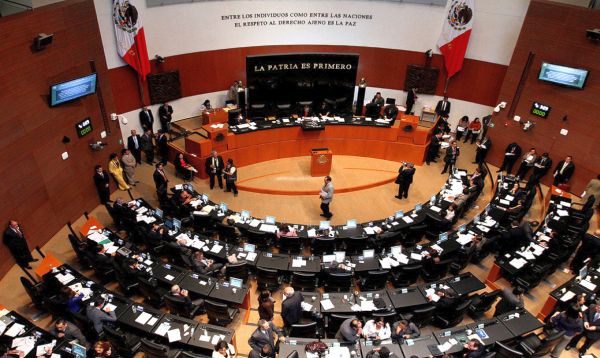Mexico City, Mexico - When Samuel Chacon took over as mayor of the southern Mexican border town of Tapachula last month, he found the equivalent of about 40 cents in the council's bank account and debts of more than $38 million.
"We have a debt from Telefonos de Mexico and they cut all of the phone lines of the city council," Chacon told local radio.
In a move aimed at preventing such surprises, the Mexican Congress on Tuesday approved a new law that will shine a spotlight on the murky world of state and municipal finances, closing loopholes allowing potential misuse of public funds and forcing governments to track spending, publish budgets online, and reveal their debts.
State and municipal debt registered with the finance ministry has more than doubled in the last five years to $404 billion Mexican pesos ($31.10 billion), although it remains moderate by international standards at an average 2.7 percent of gross domestic product.
"This law establishes mechanisms that will allow auditors access to fiscal information with the aim of sanctioning corrupt practices and the misuse of resources," said PRI Senator Francisco Yunes, who heads the chamber's economics committee.
The law will impose jail terms of up to seven years and fines of up to $25 million pesos for officials who hide or change information in their public registries.
Current laws do not require states to report all their obligations, something that will end when standardized financial reporting for all levels of government is phased in over the next two years.
According to consultancy Aregional, which specializes in public finances, only 130 of Mexico's almost 2,500 municipalities will be able to meet the new rules in time.
A finance ministry audit last year turned up $50 billion pesos in unregistered state and municipal debt, most of it in the northern state of Coahuila, which was found to be in the red by $37 billion pesos rather than the $8.5 billion on the books.
Fitch Ratings analyst Humberto Panti said there could be another $20 billion to $30 billion pesos in undisclosed debt hiding in the budgets of states and municipalities, which have enjoyed a large degree of leeway in reporting revenues, expenditure and debt.
Some states did not report obligations like money borrowed for a year or less and debts owed to suppliers and contractors.
"In that sense this initiative will make everything public, all the debt that entities have, and to us it's very positive," the senator said.
Supporters of the new law also say it will help tackle corruption and misuse of funds by creating a paper trail for all official payments, requiring employees, suppliers, and contractors to be paid by bank transfer and not cash or check.
Mexico scores just 3 out of 10 in watchdog Transparency International's index on perceptions of corruption, ranking 100th of 183 countries surveyed.
The change will also make it harder for states and councils to employ informal workers, who experts estimate cost the country $75 billion annually in taxes and lost business, exacerbating an already-low tax take.
Many states do not fully use their right to levy taxes such as property vehicle tax and are highly dependent on transfers from already-strained federal government coffers.
Finance ministry data shows seven of Mexico's 31 states have debt worth more than their annual federal grant. They include Coahuila and neighboring Nuevo Leon, the second-biggest regional economy and a former model for business development, which ratings agencies expect may have to restructure debt in 2013.
Mexico's IMCO competitiveness institute said the new law could go further in setting minimum disclosure standards, such as publishing the terms and interest rates of loans, but gave it an overall mark of 8/10.
In its latest review of state finances, IMCO found examples of debt and pension obligations reported together in one budget item and large sums assigned for "additional expenditure and provisions" with no further explanation.
"The risk of carrying on like this is that we end up like Greece," IMCO Director-General Juan Pardinas said. "At the moment state finances are fine and there is room for some states to borrow more, but if we keep up this lack of transparency we can't guarantee the health of state finances."


